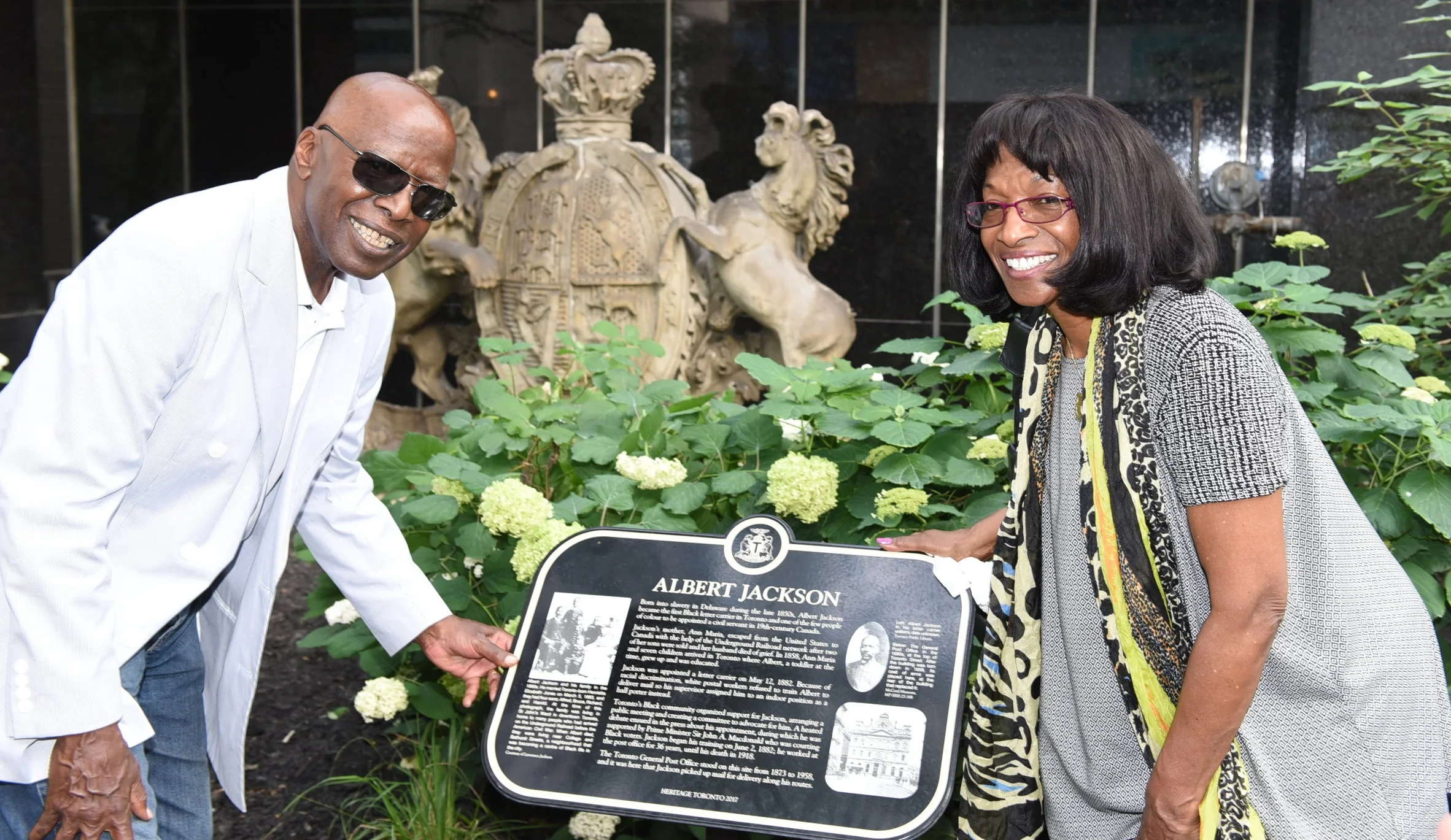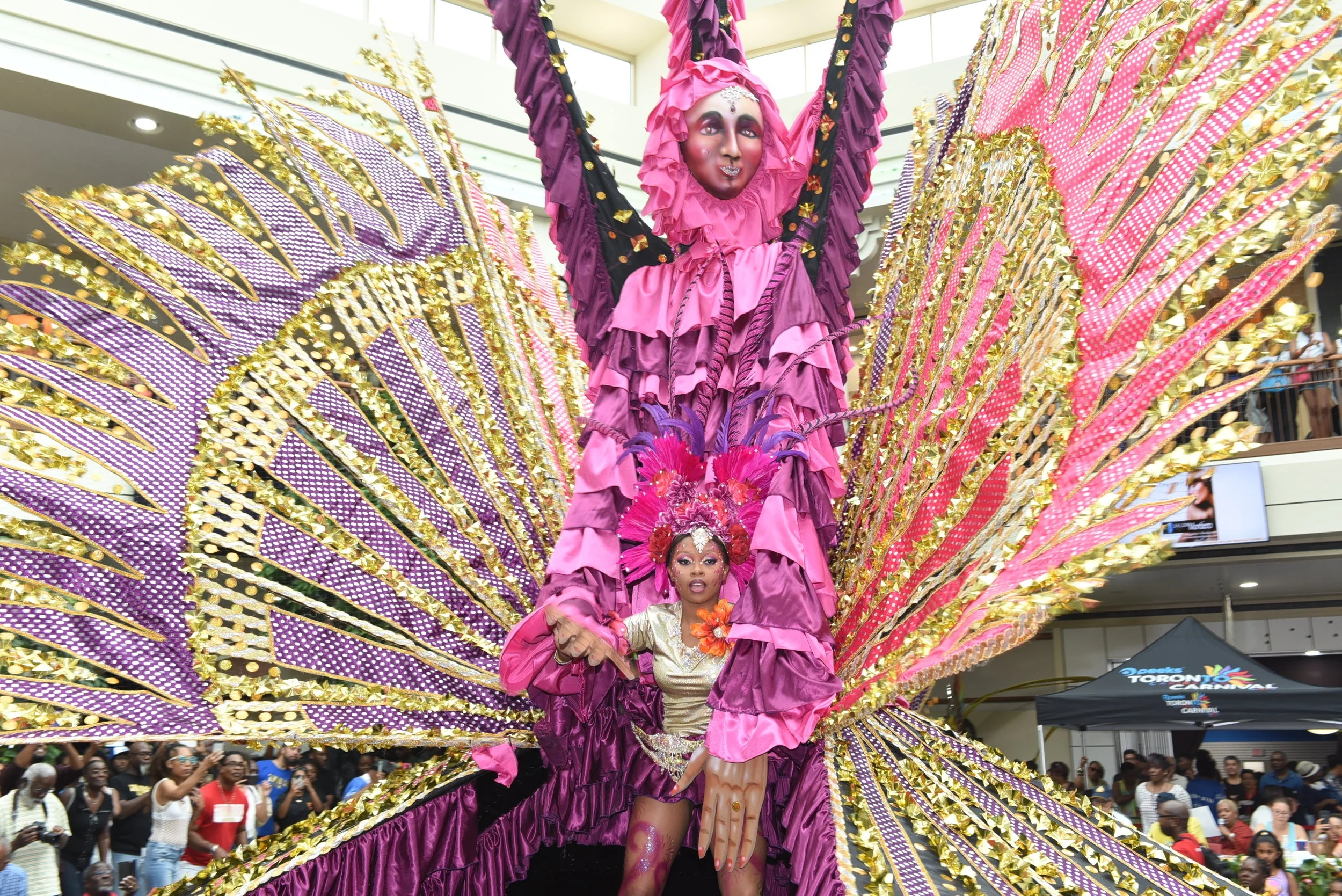Carnival pioneers and long-time volunteers celebrated
August 4, 2017
With Canada’s 100th anniversary approaching and the West Indian population in Toronto surging in the 1960s, then city parks commissioner Tommy Thompson approached a group of Caribbean immigrants with the idea of them putting on a cultural event to showcase their culture.
“We got together, talked about it and it happened,” recalled Alpha King, the president of Ozone Systems Latin America Inc., at last week’s Toronto Caribbean Carnival Ball.
A total of 15 bands took part in the inaugural carnival in 1967. Such was the success of the parade that attracted almost 30,000 spectators that then Mayor William Dennison challenged the organizers to repeat the cultural extravaganza.
“I am happy that it is still here,” said King who migrated from Trinidad & Tobago in April 1964. “This is the Caribbean community’s gift to Canada and it’s something that should be celebrated and never forgotten.”
Jamaican-born Dr. Maurice Bygrave, who came to Toronto in 1954 to join his parents, met King at a West Indian party.
“Back then, there weren’t many Blacks so we gravitated to each other once a connection was made,” said Bygrave who graduated from Harbord Collegiate Institute and the University of Toronto dental school. “On the weekends, we had a lot of social events and parties…Of course, when we were asked to do something to celebrate Canada’s centennial year, we were ecstatic.”
With Expo ’67 in full swing in Montreal, King – a sales representative with the defunct British West Indian Airways (BWIA) -- was able to secure some of the costumes displayed at the Trinidad & Tobago and Grenada tents.
He also brought late mas’ bandleader Harold Saldenah, who won six Band of the Year titles in the twin-island republic and moved to Canada in 1977, and several masqueraders, including Errol Payne who were in Montreal to the first Caribbean carnival.
Fifty years later, King and Belgrave have mixed feelings about the event that has become North American’s largest street festival.
“The business community along with the three levels of government have all reaped the benefits of our labour,” said Bygrave. “With us celebrating the jubilee, I felt this year was the time for giving back. Far too many of us are still going into our pockets to support this festival.”
Joe Mihevc, the city’s festival liaison for the last 20 years, concurred with the founding members.
“The city has put in $650,000 plus several thousand dollars into police and other services,” he said. “I look forward to the day when we get one-third from the city, province and federal government. We have got to get this funding right.”
Mihevc said the festival is one of the most complicated and difficult to pull off.
“Imagine you as a White European being told that you have to put together one European festival in one place over a two-week period,” he said. “Could you imagine the complexity of having to do that? That is what we have here with the Toronto Caribbean Carnival. We have different cultures and religions from various islands. We have the steelpan, calypso and mas’ band components and you have to mix that all together with the many interests and produce a festival. If you have led this festival, you are ready for United Nations peace work.”
Despite the challenges, Mihevc said the festival is one of the most anticipated events in the city’s summer calendar.
“We recognize it as a major cultural organization alongside the National Ballet, the Canadian Opera and the Pride Parade,” he said. “This carnival has now become a distinctive part of what it means to be Canadian and Torontonian.”
The Ball is a platform for event partners, sponsors and donors to get a taste of the carnival and network.
Individuals who made significant contributions to the carnival are also celebrated at the gala.
They include the carnival’s first chief executive officer Leslie Forbes and head judge Marline Price-Jones who is the recipient of the Kathy Searles Memorial Award.
The product of Seventh-day Adventist parents, Forbes’ early childhood revolved around playing sports, including soccer for West Ham in his San Fernando community.
Leslie Forbes
“I wasn’t allow to frequent mas’ camps and pan yards,” he recalled. “It was not until I was 11 or 12 that I decided to sneak off and follow the Midnight Robber for nearly two hours. Marked not only by his costume, the robber – a traditional carnival character – is noted for his use of ‘robber talk’.
“Up to today, I still remember that speech,” said Forbes who graduated from Osmond High School, a private institution in T & T, and the University of the West Indies.
Returning home at the height of the Black Power Movement in the late 1960s after nursing studies in England, Forbes’ first wife, who is deceased, coerced her husband to migrate.
“I had just bought a home in Diamond Vale and I was the head of the first commerce department at St. James Secondary School,” he said. “I was settled and there was no reason for me to want to leave Trinidad & Tobago. But my wife wanted to leave and she had the final say.”
Three years after migrating in September 1970, Forbes joined the Toronto District School Board where he spent 25 years before retiring as a principal.
A carnival spectator for 15 years, he joined the board in 1986 after being invited to attend a meeting by late friend Dr. Ralph Agard who was the executive director of the defunct Harambee Services Canada.
“I was a Harambee member and one night I and Ralph went to a meeting,” said Forbes. “I was elected to the board that night and made the treasurer when they found out I had a background in economics. I did an accounting course to be able to do the best job I could.”
Forbes also served as vice-chair and chair before taking a break from the organization.
When a headhunter contacted him a few years later saying she was looking for someone to head a Black organization, Forbes later found out it was ‘Caribana’ and they were seeking a chief executive officer. He took on the role, but ran into a stumbling block when the committee was refused a city grant because of an incomplete audit in 2004 and a second audit a year later that showed $9,000 was misappropriated.
“Those two bad audits sealed the fate of the Caribbean Cultural Committee (they ran the festival at the time),” said Forbes who remarried and is the father of three children. “Some people had their own agendas for getting involved.”
The Festival Management Committee (FMC), which was created by the City of Toronto, has been running the annual festival for the last 11 years.
Forbes said he was surprised when he learnt he was an awardee.
“That’s because of the schism between the FMC and the Caribana Arts Group (CAG) which replaced the CCC before the FMC was put in control,” the former East Scarborough Boys & Girls Club and Malvern Soccer League board member said. “I am a CAG founding member and I applied to be the CEO of the FMC, but didn’t get the job. I was the event manager for the King& Queen competition and the Pan Alive event since the FMC has been running the show.”
Price-Jones started volunteering with the defunct Julien Baptiste and the Buddies mas’ camp in 1988 after migrating from Trinidad & Tobago two years earlier.
Marline Price-Jones
“This award validates the significant amount of time and effort I have put into supporting our culture,” said Price-Jones who grew up in San Fernando and helped create costumes and judge carnival events in the twin-island republic.
Searles, who died in December 2008, made an extensive and continuous contribution to the carnival from its inception in 1967, when she served on the Caribbean Centennial Committee board up until 2007, when she attended the parade.
Forbes and Price-Jones along with bandleader Louis Saldenah, former Organization of Calypso Performing Artists president Colin Benjamin, musician Ossie Gurley and pan arranger Selwyn Gomes will be formally recognized in October.








